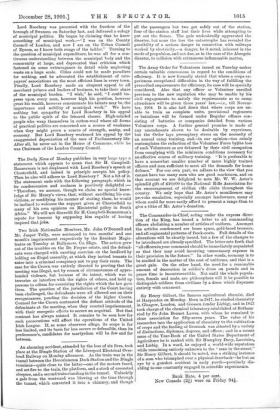Lord Rosebery was presented with the freedom of the borough
of Swansea on Saturday last, and delivered a eulogy of municipal politics. He began by claiming that he knew something of municipal work,—" I was on the County Council of London, and now I am on the Urban Council of Epsom, so I know both rungs of the ladder." Turning to the question of municipal expenditure, he was all for a con- tinuous understanding between the municipal body and the community at large, and deprecated that criticism which fastened on some extravagance in detail while neglecting waste on a huge scale. Cities could not be made paradises for nothing, and he advocated the establishment of rate- payers' associations on the most efficient lines in every town. Finally, Lord Rosebery made an eloquent appeal to all merchant princes and leaders of business, to take their share of the municipal burden. "I wish," he said, "I could im- press upon every man, however high his position, however great his wealth, however consummate his talents may be, the importance and nobility of municipal work." We have nothing but sympathy for Lord Rosebery in his appeal to the public spirit of the leisured classes. High-minded people who wrap themselves in cotton-wool where all forms of practical politics are concerned are a source of weakness when they might prove a source of strength, sanity, and economy. But Lord Rosebery weakened his appeal by the exaggerated depreciation of the uses of Parliamentary life- After all, he never sat in the House of Commons, while he was Chairman of the London County Council.


































 Previous page
Previous page